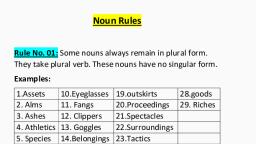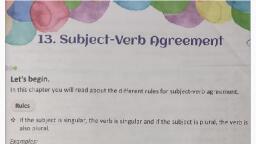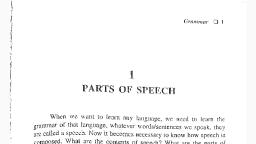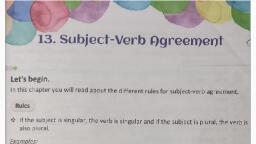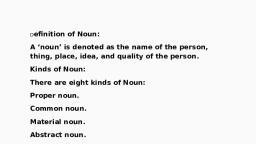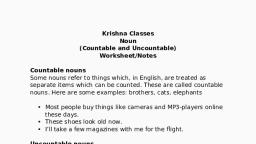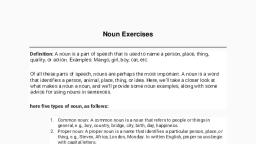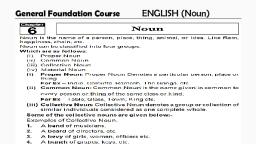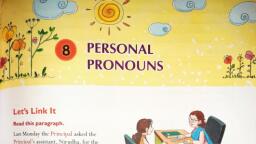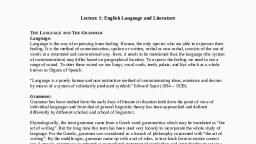Page 1 :
Grammar Ot, , Lge ge, , \, ‘, , \, , E, , {, , | L, , }, , | PARTS OF SPEECH, , \, , |, , { When we want to learn any laneu;, , i N a earn any language, we need to learn the, { grammar ot that language, whatever words/sentences we speak, they, i = r . , c, ‘ are called a speech. Now it becomes necessary to know how speech is, ‘ composed. What are the contents of speech? What are the parts of, i speech? It is primary necessity to know about parts of speech and learn, { their role in sentence and speech making., , Definition: Speech consists of sentences and sentences are, composed of words. We can divide words into different classes which, are called parts of speech according to their use., , Kinds, There are eight parts of speech. They are as follows:, Noun, Pronoun, _. Adjective, Verb, Adverb, Preposition, , Aan Pe wh, , Conjunction, , ee, , Interjection, (A) NOUN, A noun is the name of a person, or a place or a thing, It represents, , the name of some person, place, animal, quality, thing, state or action., For Example, boy, Ram, sun, moon, dog, Delhi, honesty, class, etc,
Page 2 :
2 O English Grammar, , Kinds of Nouns, , There ave five kinds of nouns. They are as follows., , Common Noun, , iG, , 2. Proper Noun, , 3: Collective Noun, 4. Material Noun, , 5. . Abstract Noun, Now we will discuss all five kinds of noun one by one., , 1. Common Noun: A common Noun is the noun shared in, common by every person or thing of the same kind or class., , Examples: Boy, gitl, book, city, table etc., , 2. Proper Noun : A proper Noun is the name of a particular, person, place or thing., , Examples: Ram, Sita, Kanpur, Delhi, Sunday, Monday etc ., , 3. Collective noun: A collective noun is the name of a, member or collection of persons or things of the same kind taken, together as one whole., , Examples: army, crowd, class, hand etc., , 4. Material Noun: A material noun is the name of the matter, or substance of which the things are made. :, , Examples: gold, silver, iron, milk, water-etc., , 5. Abstract Noun: An abstract noun is the thing or quality, which we only feel. These nouns cannot be seen nor be touched, physically., , Examples: honesty, kindness, truth, courage, sleep, anger, joy, fear, etc., , Gender, , feo Gender indicates whether a noun belongs to the male sex ©, ' e emale sex or to neither of two. This gives the knowledge how, uman beings, animals, birds and other livi if, , er living creatures are classit'¢, on the basis of sex. a, , Kinds of Gender: There are four kinds of gender in English, , x to
Page 3 :
Grammar 13, , language. They are as follows:, , lL Masculine Gender, 2. Feminine Gender, 3. Neuter Gender, , 4. Common Gender, , 1. Masculine Gender: A. noun that indicates the name of, male is of the masculine gender., , Examples: Father, Boy, Man, King etc., , 2: Feminine Gender: A noun that denotes the name of a, female is of feminine gender., , Examples: Mother, girl, women, queen., , Be Neuter Gender: A noun that denotes a lifeless object, comes under the category of neuter gender., , Examples: Pen, Book, Chair, Table etc., , 4. Common Gender: A noun that refers both either to a, male or to a female c mes under the category of common gender., , Examples: taby, child, friend, thief etc., List of Masculine and Feminine Genders, , , , , , Mé sculine Feminine, Boy Girl, , Sir Madam, Gentleman Lady, , Son Daughter, Father : Mother, Husband Wife, , Lad Lass, King Queen, Bullock _ Heifer, Colt Filly, Lion Lioness, Host - Hostess, Tutor Tutoress |, , Poet Poetess
Page 4 :
40 English Grammar, , , , Prince Princess, Tiger Tigress, Actor ‘ Actress, Governor Governess, God Goddess, Master Mistress, Duke Dutches, Hero Heroine, Bridegroom Bride., Number, , A noun has two numbers i.e. singular number and plural number,, When a noun or a pronoun denotes une person or thing it is in singular, number and when a noun or a pronoun denotes more than one Person, or things is called plural number., , Singular number: Boy, man, table, chair,, Plural number: Boys, men, tables, chairs., Use of nouns in singular and plural number, The use of nouns can be studied under the following heads (a) Nouns used only in singular form, (b) Nouns used only in plural form, (c) Nouns used both as singular and plural in the same form, , (a) Nouns used only in singular form: some nouns are used, only in singular form and they take singular verb accordingly., , Examples: scenery, information, furniture, poetry, stationery etc., , (b) Nouns used only in plural form : Some nouns are used, only in plural form and they carry plural verbs,, Example: Cattle, police, people, artillery, etc., , (c) Nouns used both, , as singular and plural in the same, form: Some nouns r, , ae used both as sin gular and plural in the same form., , Examples: audience, fish, sheep, government, , Noun-Case, , Noun-Case j i ;, S another topic which comes under noun: The CASE
Page 5 :
Grammar OS, , of a noun tells us about the position of that noun in a sentence, In other, words, case denotes the relation of a noun or a pronoun to another, word in the sentence. In English language there are five cases., , Is Nominative case, , 2 ‘Objective case, , 3. Dative case, , 4. Possessive case, , 5 Vocative case, 1. Nominative case, , A noun is said to be in the Nominative case if it is the subject, of a verb. (Subject is the person or the thing who or which carries out, the action of the verb in the sentence). Examples—, , (a) Ram is an inteHigent boy., , Here Ram is a proper noun and he is the subject of the sentence., Hence Ram is in Nominative case., , (b) The painter paints the portraits., , - The painter is a common noun and he is the subject of the, , sentence., , Hence painter is in nominative case., , (c) Iam buying vegetables for my family., , “[” ig a pronoun, but “I” is functioning as the subject of the, sentence. Hence “J” is in nominative case., 2. Objective case , :, , Nouns or pronouns are said to be in Objective case if they are, the direct objects of verbs or if they are the objects of preposition., (Direct object is the person or the things upon whom or upon which, the action of the verb is carried out). In other words, they are generally, objects of the sentence. Example —, , (a) I met your sister., , “Your sister” is object to the verb met. Hence your sister is in, objective case., , (b) The vendors sell mangoes., , Mangoes is the object of the verb ‘sell’. Hence ‘mangoes’ is in











